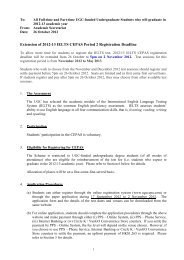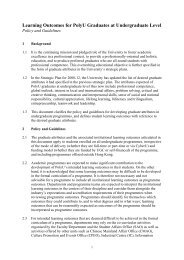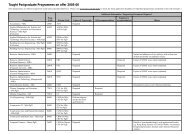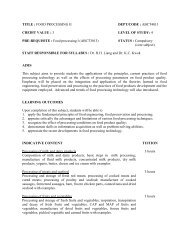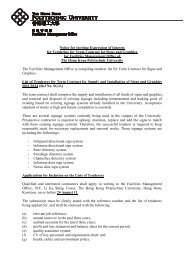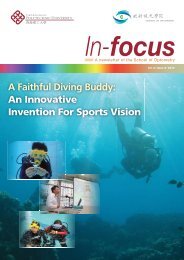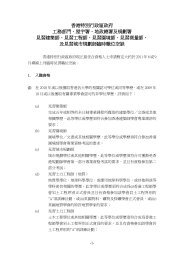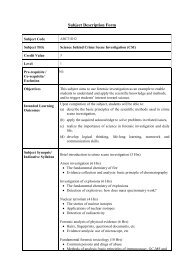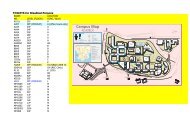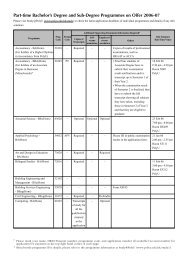CONSTRUCTION ENVIRONMENT - The Hong Kong Polytechnic ...
CONSTRUCTION ENVIRONMENT - The Hong Kong Polytechnic ...
CONSTRUCTION ENVIRONMENT - The Hong Kong Polytechnic ...
Create successful ePaper yourself
Turn your PDF publications into a flip-book with our unique Google optimized e-Paper software.
LSGI successfully held its first Global<br />
Navigation Satellite System (GNSS)<br />
School at PolyU<br />
T h e G lo b a l N a v i g a t i o n<br />
Satellite System (GNSS)<br />
School on New GNSS<br />
Algorithms and Techniques<br />
for Earth Observations<br />
( n G A T E o ) 2 0 1 2 w a s<br />
successfully held on the<br />
P o l y U c a m p u s o n 1 4 -<br />
1 5 M a y 2 0 1 2 . H o s t e d<br />
b y t h e D e p a r t m e n t o f<br />
Land Surveying and Geo-<br />
Informatics (LSGI) and<br />
supported by the Faculty<br />
o f C o n s t r u c t i o n a n d<br />
Environment, the GNSS<br />
School was also sponsored by the International Association<br />
of Geodesy (IAG) and the International Association of Chinese<br />
Professionals in Global Positioning Systems (CPGPS).<br />
<strong>The</strong> first of its kind in <strong>Hong</strong> <strong>Kong</strong>, the GNSS School was one of<br />
a series of LSGI activities to celebrate PolyU's 75th Anniversary.<br />
Officiating the School were Professor Xiaoli Ding, Head and<br />
Chair Professor of LSGI, and Dr George Liu, Assistant Professor<br />
of LSGI.<br />
One of the fastest growing technologies in modern society, GNSS<br />
is an extension of Global Positioning System (GPS) technologies<br />
that integrates multiple satellite-based positioning systems,<br />
including the Chinese Beidou (Compass). With the present<br />
GNSS technology, it is technically feasible to instantaneously<br />
pinpoint any objects with an error of only a couple of millimeters<br />
to centimeters or even less. With the aims to enhance academic<br />
exchange between LSGI researchers and their international<br />
peers as well as provide in-school MSc/PhD students an<br />
opportunity to learn more about LSGI, nGATEo2012 offered all<br />
participants an excellent forum to network and update their<br />
knowledge in selected areas.<br />
<br />
<br />
<br />
<br />
<br />
<br />
<br />
<br />
<br />
<br />
<br />
<br />
(IAG) <br />
<br />
(CPGPS)<br />
<br />
<br />
<br />
<br />
(GNSS) (GPS)<br />
<br />
<br />
<br />
<br />
<br />
<br />
<br />
<br />
<br />
Chris Rizos <br />
<br />
<br />
<br />
86%<br />
97%83% 80%<br />
<br />
Five internationally distinguished scholars from Asia, Australia,<br />
Europe and USA were invited to give lectures during the twoday<br />
event. After Prof. Ding's opening remarks, an invited speech<br />
was delivered by Prof. Chris Rizos, President of IAG as well as<br />
Professor & Head of School of Surveying & Spatial Information<br />
Systems at the University of New South Wales in Australia. More<br />
than 50 international participants from academia, industry and<br />
government agencies in <strong>Hong</strong> <strong>Kong</strong>, mainland China, Australia,<br />
and Korea were in attendance, including many in-school MSc/<br />
PhD students from mainland China.<br />
<strong>The</strong> feedback from the GNSS School participants was very<br />
encouraging. A survey of them at the end of it showed that<br />
many found the GNSS School useful (86%), informative (97%),<br />
knowledgeable (83%), and interesting (80%). More than 85%<br />
participants indicated that they would attend a similar GNSS<br />
School in the future.<br />
44



